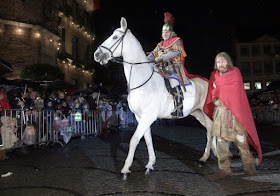The Immaculate Conception
To understand how great a grace, and how singular a
prerogative this total exemption from all sin was in Mary, we may take a survey
of the havoc that monster made amongst men from the beginning of the world,
excepting Mary.
The most holy amongst the saints all received their
existence in sin; they were all obliged to say with Saint Paul: We were the
children of wrath, even as the rest. The fall of our first father Adam
involved all mankind in guilt and misery. From that time ... sin reigned
without control on every side. By its dire effects the greatest part of the
world was plunged into the most frightful state of spiritual darkness and
blindness. Even the sons of light were born under its slavery: Abraham, Moses,
Elias, Jeremy, Job, and all the other saints confessed with David: Behold, I
was conceived in iniquities, and in sin my mother conceived me.
Sin was become a universal leprosy, a contagion which no
one could escape; an evil common to all mankind, and infecting every particular
individual that descended from Adam, as his own inherent guilt; something
accidental, and foreign to our nature, yet so general an attendant upon it,
that it might almost seem a constituent part thereof. It was communicated with
the flesh and blood which men received from their parents, and from their first
father, Adam. Every child contracted this infection with the first principle of
life.
Mary, by a singular privilege, was exempted from it, and
entered a world of sin, spotless and holy. Who is she that cometh forth as the
morning rising, fair as the moon, bright as the sun, terrible as an army set in
array! These words we may understand as spoken by the angels at the first
glorious appearance of the Mother of God, astonished to behold her, after the
dismal night of darkness and sin, as the morning rising, beautiful as the moon,
shining as the sun, decked with the brightest ornaments of grace, and terrible
to all the powers of hell, as the face of an army drawn up in battalia,
displaying her beams on the horizon of the earth, which had been hitherto
covered with the hideous deformity of sin. What a glorious spectacle, what a
subject of joy was it to the heavenly spirits, to see the empire of sin broken,
and a descendant of Adam come forth free from the general contagion of his
race, making her appearance pure, holy, and beautiful, richly adorned with the
most precious gifts of grace, and outshining the highest angels and cherubims!
Shall we refuse to her our admiration and praises? Shall we not offer to God
our best homages in thanksgiving for such a mercy, and for so great a present
which he has bestowed on the world in Mary?
O Mother of Mercy let your happy privilege, your
exemption from all sin and concupiscence, inspire you with pity for our
miseries: and by your spotless purity and abundant graces, obtain for us
strength against all our dangers, the deliverance from all our miseries, and the
most powerful remedies of divine grace.
~ Alban Butler














